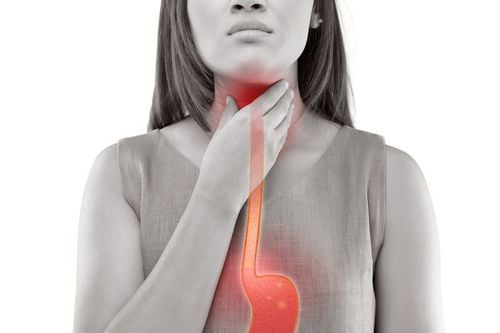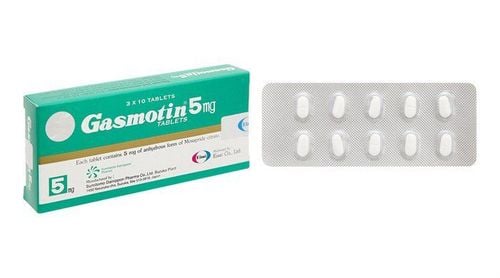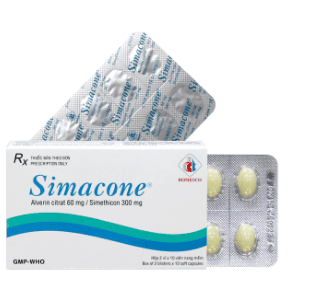This is an automatically translated article.
The article was consulted with MSc Duong Van Sy - Department of Pediatrics - Neonatology, Vinmec Hai Phong International General Hospital.Abdominal bloating in infants is a common symptom. This is a sign of digestive system abnormalities in babies. However, you can completely detect and treat your baby's colic condition with simple measures that can be done at home.
1. What is flatulence in infants?
Abdominal bloating in infants is a common symptom in infants that causes great concern for mothers. Newborns have gas because babies often swallow a lot of air from the two processes of sucking and crying. Babies cry a lot because they are the only language of communication.On the other hand, in children under one year of age, it is still a stage where the infant's digestive system is developing and getting used to, from the ability to tolerate, absorb, and excrete. In the first months of getting used to milk and the increase in milk production, from 6 months, you have to get used to the weaning diet, with an increase in both quantity and type of food. Gas is also produced during the digestion of food or the activity of intestinal bacteria. In addition, breastfeeding or feeding too much for the ability to digest also lead to infant colic.
2. The reason why babies are full of life

Inability to digest proteins in milk: When your baby is breastfed or bottle-fed, he often has bloating, it may be because the baby's body cannot digest sugar. Lactose is present in breast milk or formula. Excess lactose from breast milk: The reason is because the lactase enzyme in the baby's body is not enough to digest all the lactose the baby tolerates. Due to the influence of the mother's nutrition: During breastfeeding, what the mother eats will have a direct impact on the infant's digestive system later on. If the mother eats too many foods that cause bloating, the baby will also be prone to bloating. Some foods that can cause a baby to feel bloated if you eat a lot of them include: Legumes, Brussels sprouts, cabbage, cauliflower and broccoli, oats, avocado, peaches, pears, oranges, lemons , plums and prunes... Due to unhygienic children's drinking utensils...
Trắc nghiệm: Sự phát triển tinh thần, vận động của bé thế nào là đúng chuẩn?
Khi nào bé biết nói, biết hóng chuyện hay biết cầm cốc là "đúng chuẩn"? Điểm xem bạn biết được bao nhiêu mốc phát triển tinh thần, vận động "đúng chuẩn" của bé nhé!The following content is prepared under supervision of Thạc sĩ, Bác sĩ y khoa, Ma Văn Thấm , Nhi , Phòng khám Đa khoa Quốc tế Vinmec Dương Đông(Phú Quốc)
3. Infants with flatulence, abdominal distension should do?
Bloating in babies is sometimes a sign of some problems with the baby's digestive system. For example, gastroesophageal reflux disease does not always present with regurgitation, so it is sometimes mistaken for infant gas. Here are 3 ways you can check for more serious problems in your baby:See your baby's poop. If your baby is constipated or has diarrhea, it could be a sign of problems with the infant's digestive system. Signs can be a change in stool consistency or color, all of which can signal a digestive problem. Take note of your baby's general feelings. If your baby seems satisfied most of the time, there is generally nothing wrong with her. But if your baby refuses to feed or has trouble sleeping, and you can't reassure him, it could be a more serious problem. Watch for other symptoms. Symptoms such as fever or blood in the stool also indicate problems other than just bloating. See your pediatrician if your baby exhibits any of these symptoms.
4. Management of flatulence in infants

4.2 Abdominal massage when babies have bloating Massage is an effective way to reduce colic in infants. First, mothers need to reduce the amount of gas in the baby's stomach, helping the child feel more comfortable and comfortable. To make the baby more comfortable, the mother needs to massage the baby's belly regularly, not only will the baby feel comfortable, but this will reduce the amount of gas in the stomach effectively. The mother should gently use her fingers to rotate in a clockwise direction from the belly button to the outside of the baby's belly. Massage oil can be used so that the mother's hands do not hiss when touching the baby's skin. However, do not massage immediately after the baby has finished eating.
4.3 Apply heat to the abdomen Using a hot pack to apply to the abdomen reduces the feeling of gas and bloating in infants. Taking advantage of the heat and weight of the pack will reduce colic in infants. To do this, take 2 hand towels and warm them up, not too hot. You can dip it in hot water and wring it out. Test the heat by applying it to your hand. Then fold a towel into a pack and place it on your baby's tummy. Take the second towel and wrap it around your baby's belly to secure the first. Care should be taken to wrap it not too tight, not too hot.
4.4 Helping your baby burp Ợ belching is an effective method to help your baby reduce colic in infants. After feeding the baby, the mother should not put the baby down immediately, but should carry the baby on her shoulder or let the baby lie on her stomach on her lap or sit with her hands behind the baby's back and head and burp the baby.
After each feeding, don't forget to burp your baby. You can try different poses and methods.
Baby rests her head on your shoulder and pats her back gently. Baby rests her head on your shoulder and rubs her back in circular motions along the spine from the bottom up to the neck. This movement helps bring air from the abdomen up and out. Place your baby on your lap, hold your baby's chin lightly with one hand while the other hand rubs or pats your baby's back. Lay your baby on his stomach on your lap and pat or rub his back. If your baby still shows signs of gas, you can do the movement several times. 4.5 Changing the way you feed your baby A small change in your meal can make a huge difference. If you're breastfeeding, make sure your baby is latching on properly to avoid sucking in excess air. For bottles, you should switch to a bottle with a slow-flow nipple to prevent your baby from choking. And as always, make sure your baby is lying on her side to better aid her digestion. When the baby is nursing, do not let the air in to avoid the baby inhaling the vapors.
4.6 Give your baby water to drink

When children have bloating and gas for a long time, vomiting a lot, anorexia, fussiness, slow weight gain..., parents need to take their children to see a gastroenterologist to find the cause and get help. early, timely and proper treatment advice.
As a key area of Vinmec Health system, Pediatrics Department always brings satisfaction to customers and is highly appreciated by industry experts with:
Gathering a team of top doctors and nurses in Pediatrics : consists of leading experts with high professional qualifications (professors, associate professors, doctorates, masters), experienced, worked at major hospitals such as Bach Mai, 108.. Doctors All doctors are well-trained, professional, conscientious, knowledgeable about young psychology. In addition to domestic pediatric specialists, the Department of Pediatrics also has the participation of foreign experts (Japan, Singapore, Australia, USA) who are always pioneers in applying the latest and most effective treatment regimens. . Comprehensive services: In the field of Pediatrics, Vinmec provides a series of continuous medical examination and treatment services from Newborn to Pediatric and Vaccine,... according to international standards to help parents take care of their baby's health from birth to childhood. from birth to adulthood Specialized techniques: Vinmec has successfully deployed many specialized techniques to make the treatment of difficult diseases in Pediatrics more effective: neurosurgery - skull surgery, stem cell transplantation. blood in cancer treatment. Professional care: In addition to understanding children's psychology, Vinmec also pays special attention to the children's play space, helping them to have fun and get used to the hospital's environment, cooperate in treatment, improve the efficiency of medical treatment.
Please dial HOTLINE for more information or register for an appointment HERE. Download MyVinmec app to make appointments faster and to manage your bookings easily.















